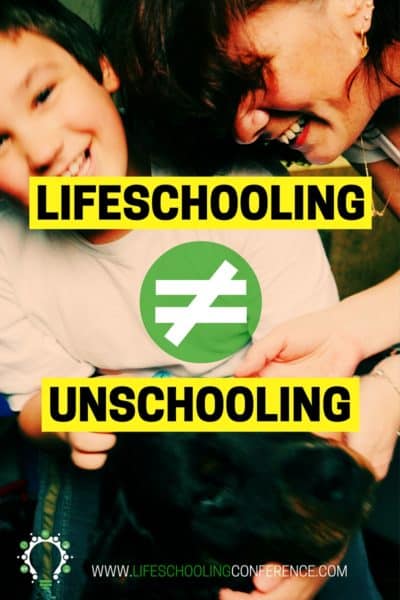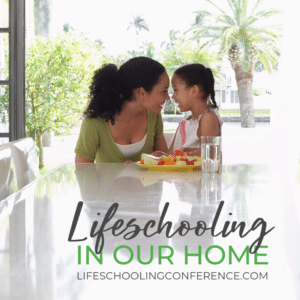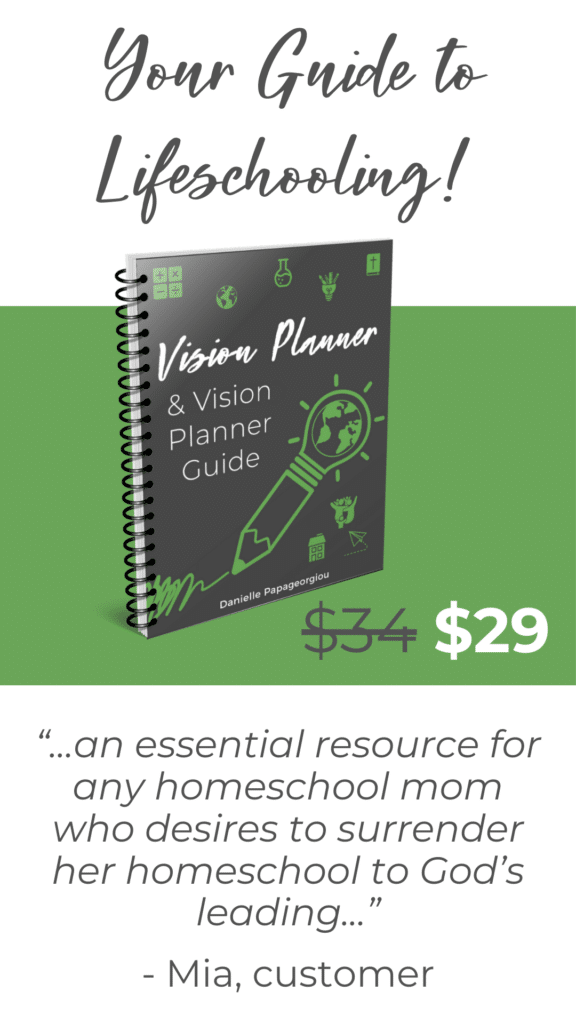Why Lifeschooling is not Unschooling
The mission statement of our Lifeschooling Conference reads as follows:
Lifeschooling is the process of discovering your child’s God-given gifts and talents through real life experiences that happen within the context of your family’s unique situations and missions.
Lifeschooling is the freedom to educate as God calls you to, not as the Scope and Sequence, state regulation, or curriculum dictates.
The mission of the Lifeschooling Conference and Activities Fair is to encourage moms and dads that homeschooling can merge with a healthy family life and whatever life circumstances God brings, and to challenge the conventional model of age-segregated, subject-divided, desk-confined schooling that has infiltrated the homeschooling movement.
At first glance, this may seem like simply another version of “unschooling.” In fact, in reading the Wikipedia entry, I have to say there is much about the unschooling philosophy that I have to agree with. However, I believe there are some subtle, but significant differences. The main difference undergirding the entire thing is that in Lifeschooling, God is at the center of education (not the philosophies of Jean-Jacques Rousseau, Paul Goodman, and A. S. Neill, as is the case with unschooling). Here are the subtle differences that come as a result:
-
- The unschooling philosophy stresses child-led learning; Lifeschooling focuses on what God has put into that child to do. It is not purely about what my children want to study and what interests them. This is merely an indication of what gifts God may have put into them. Children are not innately good, as Neill (see above) proposed and they do not innately always choose to study things that relate to their giftings and what God has purposed for their lives.As their parents, God has given us the important duty of helping them discover what those gifts are. And I can tell you that if my children are “led” to play video games all day, I do not take that as an indication that God has gifted them in this area. 😉 That being said, God has gifted each child and they will often naturally be drawn toward the subjects and activities that allow them to exercise those gifts. Pay close attention. Lifeschooling is about discovering and creatively developing those gifts.
- The unschooling philosophy puts the individual child’s interests first; Lifeschooling focuses first on the family’s needs.If my children’s learning interests conflict with our family life, then I have to question whether or not this is something they need to learn right now. Or I need to find a way to integrate it into what God has already brought to us. For (somewhat real life) example, if my child wants to be involved in a play that requires weekly practice at a location 30 minutes away, but we have a homestead to maintain and a family member who struggles with his health, more consideration will be given to the family as a whole, while paying careful attention to other ways to meet this child’s gift-development need. Perhaps forming our own “theater group” within our small church would be one option, as seeing them every week is already part of our lives.It is about teaching our children how to follow Phillipians 2:3-4, “Do nothing from selfish ambition or conceit, but in humility count others more significant than yourselves. Let each of you look not only to his own interests, but also to the interests of others.” Lifeschooling is about balance in family life.
- The unschooling philosophy almost completely banishes curriculum; Lifeschooling encourages learning through real life, but also using what works for each family.It is about freedom not legalism. Some children enjoy and learn well using certain curricula. Others don’t. But it should always be used only as a guide because each child and each individual family and each week and day is different. We cannot tell what learning opportunities (read “family emergencies,” “unexpected guests,” “relationship problems,” “sick days,” etc.) God may bring into each day and if we are so focused on getting page 72 done because it is the next lesson and “on the schedule” and “we will get page 72 done today even if the house burns down,” then we may completely miss those opportunities that God brings! Lifeschooling is about freedom to listen to God over the curriculum author.
- The unschooling philosophy prioritizes fun in learning; Lifeschooling emphasizes fun, but also acknowledges an “essential body of knowledge” (though much smaller than what is proposed by traditional schools).Do not misunderstand me on this point. At all costs, make learning fun! Studies have proven that children learn best through play. Why? Because they are simply having fun and learning about their world in the process. And make learning real. Integrate it with real life so that children can see the practical value and meaning. But in my understanding of unschooling, we would not teach our children multiplication if we could not make it fun or if they did not have the interest.I don’t know about you, but I can’t think of any possible way to make multiplication fun. (That being said, I never did learn my facts very well. But I am surviving fine). I do my very best to make it fun and to incorporate it into real life, but for certain children, it will never be fun. They will still need to learn it (as much as possible 😉 )! You are the parent and with God’s guidance, you must decide what that essential body of knowledge looks like. And it will probably look slightly different for each child. Lifeschooling is about fun and the fundamentals…which may or may not always be combined.
So no, lifeschooling is not unschooling. Lifeschooling is so much more! And our desire at the Lifeschooling Conference is to set parents free from the burden of what homeschooling has become. There is a better way. A way that merges life with homeschooling. It’s the way this whole movement actually started and it is time to return to our roots. For further reading, I recommend a “revolutionary” book written by pioneer “lifeschooler” Chris Davis called “Gifted: Raising Children Intentionally.” I hope you’ll join us for our next Lifeschooling Conference to learn more about how to “merge life with homeschooling”!
- The Book Writing Process: 5 Essential Tips (Plus a few more) - June 26, 2025
- Inspirational Missionary Stories for your Homeschool - March 5, 2025
- Tips for Building Healthy Relationships - February 17, 2025





9 Comments
[…] order to show that distinction, I am sharing a blog that my friend, Danielle Papageorgiou, wrote about lifeschooling in which she says, “The main […]
I signed up and paid for the lifeschooling conference. It says the links are included in the email but I do not see them anywhere.
Hi Shelley! Are you referring to the videos? I apologize that I did not see this until now. Can you please send an e-mail to info@lifeschoolingconference.com so we can get this straightened out? Thanks!
You have no idea the measure to which you have blessed me this evening. I have never homeschooled ‘traditionally’ but I have also never fully embraced Lifeschooling, the very means of teaching that I have felt the Lord lay on my heart time and again. Too much world pressing in and a lack of confidence in my freedom in a Christ, I suppose. Thank you for sharing your heart as it literally put words to what I have always desired and felt God leading us towards but could never voice myself. I look forward to many more fascinating reads in the near future!
I am so glad to hear this was a blessing to you, Reggie! Comments like this really brighten my day! 🙂 I am thankful God has allowed me to be used to encourage you and others to embrace lifeschooling!
Hello,
I really appreciate your perspective. I enjoy reading your posts, but find the type font a bit difficult to read for very long. It is too “thin” on your white background. A thicker font would help. One page I could put in “reading mode” on my iPad, and that helped tremendously, but not all pages seemed equipped with that option. Thank you.
I agree, Kathleen, and appreciate the feedback! 🙂 I am not sure how to change it, since it’s part of the site’s theme, but I have also thought it’s a bit tricky to read sometimes. I will look into what can be done.
I really like this. I’ve struggled with the title of Unschooler since the very beginning, even though we’ve been homeschooling close to that style, I have always used and preferred Eclectic instead, cause though we hadn’t used much curriculum while my kids were little, I’ve never been opposed to using whatever will work best for each child. I always felt the official unschooling..rules lol…really pushed for No curriculum, No workbooks, Nothing that looks “school-y”. Most families I know that call themselves unschoolers don’t stick to this anyway, but I feel like saying..maybe call yourself something else! Ha
I love the life schooling philosophy,
that its specific focus on God and His plans for each child and the family as a unit. I’m looking forward to the conference so I can learn more!
Thanks
Thank you for your comment, Kaitlyn! 🙂 I’m glad this post was helpful to you and glad you’re joining the conference!